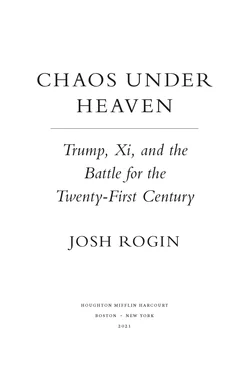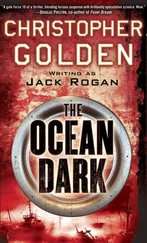Virtually everyone I interviewed for this book had an awakening story; a moment in their personal or professional lives when they realized that the grand strategic competition between the United States and China was the most important foreign policy issue in the world and the most important project they would work on in their lifetime. Many also said this was an awakening to the aggressive and malign character, behavior, and strategy of China’s leadership: the Chinese Communist Party (CCP), a hundred-year-old revolutionary organization that is determined to expand its influence and increase its power, and which has few limits to the methods it will use to advance its interests.
My own awakening was in the summer of 2003, in a tiny, windowless office at a law firm in Philadelphia’s Rittenhouse Square. It is how I fell—unintentionally and unexpectedly—into journalism, and how I found myself on the path that led me to write this book. It’s a journey you are now joining me on. And if you haven’t yet had your awakening, this book aims to spark it.
Just twenty-four years old at the time, I had returned to Philadelphia after four years in Washington, DC, at the George Washington University, followed by a year teaching English at a conversation school in Yokohama, Japan. My new job was a paralegal position at Berger Montague, a firm that has made history using the American legal system to seek justice for human rights crimes committed abroad. I was assigned to a team working to sue the government of Sudan for genocide in what was then southern Sudan, and as I pored over the research on the case, I found a trove of State Department documents that revealed that China, in a bid to maintain a stable supply of oil from Sudan, had secretly helped to perpetuate the bloodshed. From providing a grant agreement worth $2.5 million for “any project” deemed worthy by Sudanese officials, to promising diplomatic support to remove international sanctions, to smuggling illicit arms to the government as it continued to target civilians, Beijing had helped to prop up Khartoum and enable its rampage—all out of a thirst for the oil that China needed to fuel its booming economy.
Confronted with the cold, calculated support of the CCP for the atrocities in Sudan, I was simultaneously impressed and horrified by the sophistication and ruthlessness of the scheme. China was outside the reach of the litigation, so I decided to send a copy of the files to an old college friend and China hand in Washington, Joshua Eisenman, who was then working at the New America Foundation, a relatively new, centrist-minded DC think tank. Today, stories of China’s corrupt practices in Africa have become ubiquitous, but in 2003, firm evidence of these examples was still scarce. Eisenman took one look at the documents I had sent him and said that we needed to publish this information. We coauthored an op-ed that was published on July 23, 2003, in the Straits Times of Singapore. Entitled “China Must Play by the Rules in Oil-Rich Sudan,” the article revealed that Beijing was using bribery and corruption to secure energy resources and intentionally fueling crimes against humanity to do it. We argued the United States had a moral imperative and national security interest in opposing China’s abuses in Africa.
I didn’t think the article would get much attention. But within twenty-four hours, it had been shared around the world, appearing in energy trade publications and on websites covering Africa. The partners at Berger Montague were furious. They did not appreciate their twenty-four-year-old paralegal making international news on their case. Also, publicity was explicitly counter to their legal strategy.
I started to surf the internet for job openings, my law school applications sitting incomplete on my desk. I applied to the Japanese newspaper the Asahi Shimbun to be a news assistant in their DC bureau. I sent them the article from the Straits Times. At the interview, they said I had broken a big story. I got the job and moved back to Washington. Law school isn’t going anywhere, I thought. This sounds like an adventure.
After two and a half years covering the Pentagon for Asahi, I got a job at a trade publication covering the IT industry called Federal Computer Week. The first article I wrote for the magazine was about Chinese cyber spying as detailed by the Pentagon in their annual report on China’s military power; the first big scoop I broke was when the head of Naval Network Warfare Command admitted to me that Chinese government-sponsored hackers were attacking “everything and anything” inside the US military. I could see that the US government wasn’t prepared for what insiders were watching unfold—a drive by a foreign power to use hybrid warfare to transfer huge amounts of knowledge in ways we couldn’t stop and couldn’t even really understand. I documented how the technology had outpaced US policy when it came to stopping China’s cyberattacks and how the US government was so divided and bureaucratic that even senior leaders who recognized the threat could not properly address it. Eventually, I broke enough stories to be offered a more prestigious gig, working for Congressional Quarterly, then the premier trade publication covering the inner workings of Capitol Hill.
It was while reporting for Congressional Quarterly that, in a 2007 Congress, I found the beginnings of the effort to understand, call out, and then push back against a range of Chinese government actions. Other people in Washington had been experiencing awakenings of their own. There were different camps for different issues. There was a group of Christian lawmakers who were passionate about standing up to Beijing’s human rights abuses. There was a group of defense hawks who were warning about China’s nascent but growing capabilities. And there were the trade protectionists, who had tracked China’s economic strategy since Congress granted Beijing most-favored-nation status in 2000 and China was admitted to the WTO the following year.
Soon after the Obama administration came in, I moved to Foreign Policy magazine, where I covered the State Department under Secretary Hillary Clinton. This was a period of great debate over how to deal with a China that had clearly become more problematic but had yet to abandon Deng Xiaoping’s mantra, “Bide your time, hide your strength.” The 2008 Olympics were Beijing’s declaration of its status as a world leader and its claim for the respect that entails. But the accompanying crackdown on Tibetans protesting for basic rights simultaneously showed the world that the party was willing to do anything to crush dissent and maintain power. This was the same year Xi was anointed as the next president of the country and general secretary of the party.
I continued to track the China story as I migrated to the then-hybrid publication Newsweek/Daily Beast, and then to Bloomberg View —and finally, in June 2016, to the Washington Post, where I took up a position as a columnist for the paper’s Global Opinions section, a post that I still hold as of this writing.
When I started out covering US-China relations in 2004, I and the other members of the twentysomething gang of Asia experts, congressional staffers, and government officials I became friends with were just starting out in our careers. By 2016, the young China hands of 2004 had become middle-aged China hands, now spread throughout the government, Congress, and even a few in the media. Over that time, we watched the generation of China hands and government leaders above us struggle mightily over the question of how to deal with a China that was steadily becoming more externally aggressive and internally repressive and using its rising power and influence in malign ways against us.
Читать дальше











